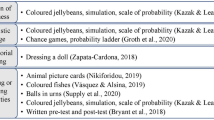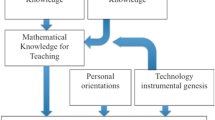Abstract
The recent proliferation of science simulation software presents philosophy of science instructors with a viable means to reaching greater numbers of students in both science and non-science majors. The software, when combined with an interrogative approach which construes science as a pragmatically constructivist process, provides the opportunity to explore myriad practical and conceptual problems. This paper examines some of the potential, and some of the problems, inherent in using computerized simulations in science and science studies classes by applying lessons from the epistemology of science. It concludes that, while computer simulations are extremely useful pedagogical tools, they are not experiments, and are thus of only limited utility as a substitutes for actual laboratories.
Similar content being viewed by others
REFERENCES
Ackermann, R.: 1985, Data, Instruments and Theory: A Dialectical Approach to Understanding Science, Princeton University Press, Princeton, New Jersey.
Duhem, P.: 1954, The Aim and Structure of Physical Theory, Wiener (trans.), Princeton University Press, Princeton, New Jersey.
Franklin, A.: 1986, The Neglect of Experiment, Cambridge University Press, New York.
Franklin, A.: 1990, Experiment: Right or Wrong, Cambridge University Press, New York.
Galison, P.: 1987, How Experiments End, The University of Chicago Press, Chicago.
Hacking, I.: 1983, Representing and Intervening: Introductory Topics in the Philosophy of Natural Science, Cambridge University Press, New York.
Harré, R.: 1981, Great Scientific Experiments: Twenty Experiments that Changed our View of the World, Oxford University Press, New York.
Hickman, L.: 1990, John Deweys Pragmatic Technology, Indiana University Press, Bloomington.
Hilpinen, R.: 1988, 'On Experimental Questions', in D. Batens & J.P. van Bendegem (eds.), Theory and Experiment, D. Reidel, Boston, pp. 15-29.
Kuhn, T.: 1970, The Structure of Scientific Revolutions, The University of Chicago Press, Chicago.
Lakatos, I.: 1978, in J. Worrall & G. Currie (eds.), The Methodology of Scientific Research Programmes, Cambridge University Press, New York.
Laudan, L.: 1977, Progress and Its Problems, University of California Press, Berkeley.
Matthews, M.: 1994, Science Teaching: The Role of History and Philosophy of Science, Routledge, New York.
Minsky, M.: 1975, 'A Framework for Representing Knowledge', in J. Haugeland (ed.), Mind Design, MIT Press, Cambridge, Massachusetts, 1987, pp. 95-128.
Pickering, A.: 1984, Constructing Quarks: A Sociological History of Particle Physics, Edinburgh University Press, Edinburgh.
Popper, K.: 1959, The Logic of Scientific Discovery, Basic Books, New York.
Quine, W.V.O.: 1963, From a Logical Point of View, Harper Torchbooks, New York.
Simonson, M.R. & Thompson, A.: 1994, Educational Computing Foundations, Macmillan, New York.
Sintonen, M.: 1989, 'Explanation: In Search of a Rationale', in P. Kitcher & W. Salmon (eds.), Scientific Explanation, University of Minnesota Press, Minneapolis.
Thagard, P.: 1988, Computational Philosophy of Science, MIT Press, Cambridge, Massachusetts.
Author information
Authors and Affiliations
Rights and permissions
About this article
Cite this article
McKINNEY, W.J. The Educational Use of Computer Based Science Simulations: Some Lessons from the Philosophy of Science. Science & Education 6, 591–603 (1997). https://doi.org/10.1023/A:1008694507127
Issue Date:
DOI: https://doi.org/10.1023/A:1008694507127




